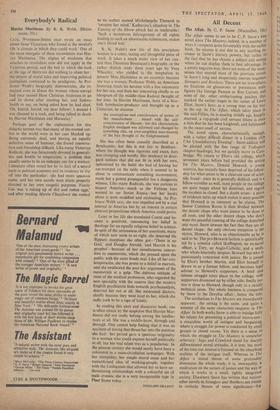Everybody's Radical
Harriet Martineau. By R. K. Webb. (Heine- mann, 35s.) CECIL WOODHAM-SMITH once wrote an essay about those Victorians who found in the invalid's life 'a climate in which they could work.' One of the most energetic of these recumbents was Har- riet Martineau. The stigma of weakness that attaches to invalidism now did not apply in the Victorian period, and the bed to which she took at the age of thirty-six did nothing to abate her: the stream of moral tales and improving political journalism continued to be prodigious. As Pro- fessor Webb's biography demonstrates, she re- mained even in illness the woman whose energy had once caused Hans Christian Andersen to go and lie down after meeting her, and Sydney Smith to say, on being asked how he had slept, 'Oh, horrid, horrid, my dear fellow! 1 dreamt I was chained to a rock, and being talked to death by Harriet Martineau and Macaulay.'
Perhaps part of the explanation for this didactic torrent was that many of the normal out- lets to the world were in her case blocked up. Being extremely deaf, and having an equally defective sense of humour, she found conversa- tion and friendship difficult. Like many Victorian Radicals, she was ferociously devoted to generali- ties and hostile to empiricism, a position that tsually seems to be an unhappy one for a woman. Literature often vexed her by its lack of a sound basis in political economy and its tendency to slip off into the particular: she had more spacious tastes, and her own novels were tracts properly directed to her own exegetic purposes. Vanity Fair was 'a raking up of dirt and rotten eggs,' and after reading Martin Chuzzlewit she rushed to an author named Michelangelo Titmarsh to 'sweeten her mind.' Katharina's situation in The Taming of the Shrew struck her as intolerable: 'Such a monstrous infringement of all rights, leading to such an abominable submission, makes one's blood boil.'
R. K. Webb's new life of this precipitate woman is a sober, taxing and thoughtful piece of work. It takes a much wider view of her con- text than Theodora Bosanquet's biography, or the rather skittish study three years ago by Vera Wheatley, who yielded to the temptation to present Miss Martineau as an eccentric because she was a woman; Professor Webb, an American historian, treats his heroine with a fine unconcern for her sex, and finds her interesting chiefly as an ideogram of the middle-class Radical thought of her time. In Harriet Martineau, born of a Nor- folk bombazine-producer and brought up as a Unitarian, he discerns the assumptions and consciousness of power of the manufacturer . . . mixed with the self- consciousness of Dissent: but this characteristic English amalgam was informed and changed by something else, an over-simplified near-travesty of the best thought of the Enlightenment.
She has often been casually described as a Benthamite, but this is not fair to Bentham : where his thought was rigorous and exact, hers was sweeping and woolly. Her tendency to disre- gard notions that did not fit in with her own, epitomised by the habit she had of leaving her ear-trumpet on the table when it seemed to be about to communicate something inconvenient, made her a potent propagandist but a dangerous witness. Like many Radicals, she was curious to inspect America—much as the Fabians later wanted to see Soviet Russia--but her books about it were muddied and misleading. As Pro- fessor Webb says, she was impelled not by a real interest in America but by an interest in certain abstract propositions which America could prove.
Later in her life she translated Comte and be- came a positivist, renouncing her belief in theology for an equally religious belief in science. In spite of the seriousness of her assertions, many of which now seem to us right, she deserved the flippant reception she often got—There is no God,' said Douglas Jerrold, 'and Harriet is his prophet'—because of her simultaneous conver- sion to mesmerism, which she pressed upon the public with the same heady zeal. Like all her con- temporaries, she was prone to a belief in marvels,
and she swallowed the post hoe arguments of the
mesmerists at a gulp. The dubious attitude of most of the medical profession, who regarded the new speciality with the reserve that the modern English psychiatrist feels towards psychoanalysis, deterred her not at all. She mistrusted doctors, chiefly because they were kind to her, which she sadly took to be a sign of falsity.
In reading this alert and discursive book; one is often struck by the suspicion that Harriet Mar- tineau did not really belong among the intellec- tuals at all. She was a middle-brow, through and through. One cannot help feeling that it was an accident of timing that thrust her into the position she had : her period gave a spurious originality to a woman who could express herself politically at all, but her real talent was as a populariser. In the present century she would surely have been a columnist in a mass-circulation newspaper. With her intrepidity, her simple moral sense and her romanticised idea of working-people, together with the Lesbianism that allowed her to have un- threatening relationships with a colourful set of male cronies, she is a very recognisable type in Fleet Street today.
PENELOPE GILLIATT


































 Previous page
Previous page